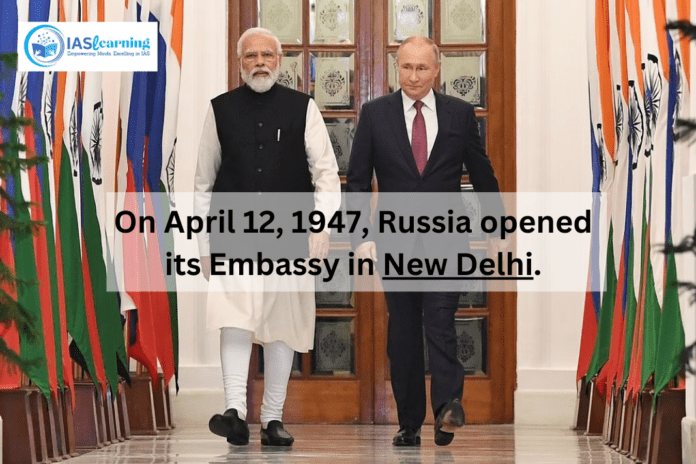Historical Background
- India and Russia have enjoyed a strong and enduring partnership since 1947.
- The Treaty of Peace and Friendship in 1971 solidified their shared goals and contributed to regional and global peace and security.
- The dissolution of the Soviet Union led to a new Treaty of Friendship and Cooperation in 1993.
- A bilateral Military-Technical Cooperation agreement was established in 1994.
- In 2000, during President Putin’s visit to India, the “Declaration on the India-Russia Strategic Partnership” was signed, significantly enhancing bilateral cooperation.
- In 2010, the partnership was elevated to a “Special and Privileged Strategic Partnership.”
Political Relations
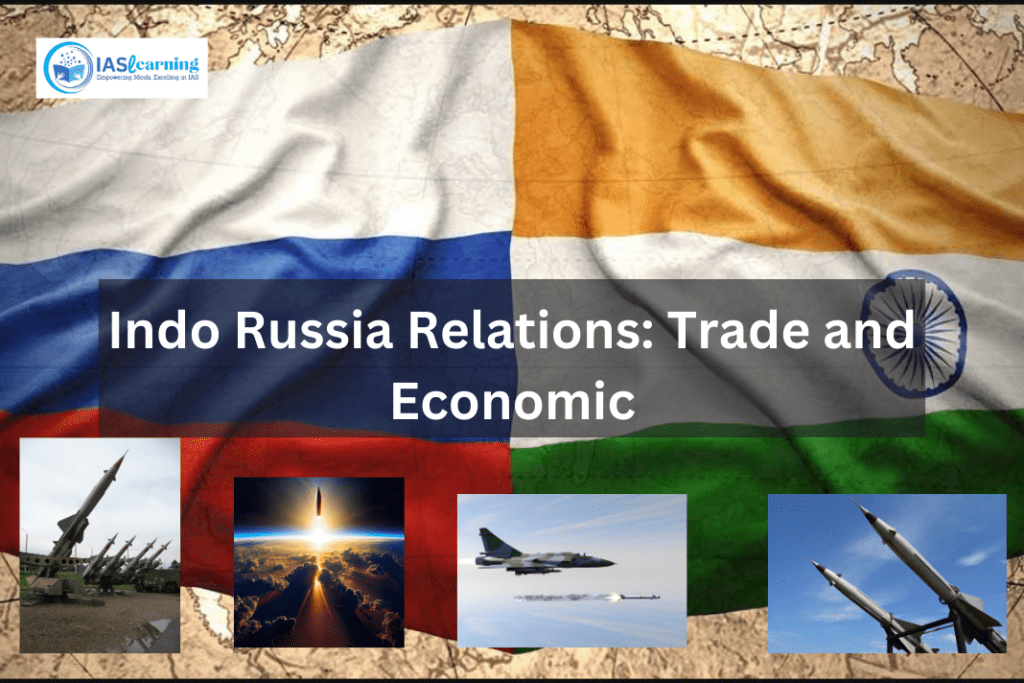
- India seeks Russia’s support for a permanent seat on the UN Security Council.
- Russia has consistently supported India’s position on the Kashmir issue.
- Both nations actively participate in multilateral forums such as BRICS and the Shanghai Cooperation Organisation (SCO).
- The annual summit meetings serve as the highest institutionalized dialogue mechanism.
International/Multilateral Organisations and Connectivity Projects
- India and Russia collaborate within BRICS, SCO, NSG, and aim to reform the UN Security Council.
- Trade and economic relations are a priority, with targets to increase bilateral investment and trade.
- The International North South Transport Corridor (INSTC) facilitates trade connectivity between India, Iran, Azerbaijan, and Russia.
Energy Ties
- India is poised to become the world’s third-largest oil consumer, and Russia plays a significant role as an energy partner.
- Collaboration in the oil and gas sector and peaceful nuclear energy.
- Notable projects include the Kudankulam Nuclear Power Plant and cooperation in the Rooppur NPP construction in Bangladesh.
Defense Ties
- Defense cooperation has evolved from a buyer-seller model to joint research and development.
- Flagship examples include the BrahMos Missile System, licensed production of aircraft and tanks in India, and the S-400 missile defense system.
- Growing defense engagement aligns with India’s “Make in India” initiative.
Countering America’s Adversaries through Sanctions Act (CAATSA)
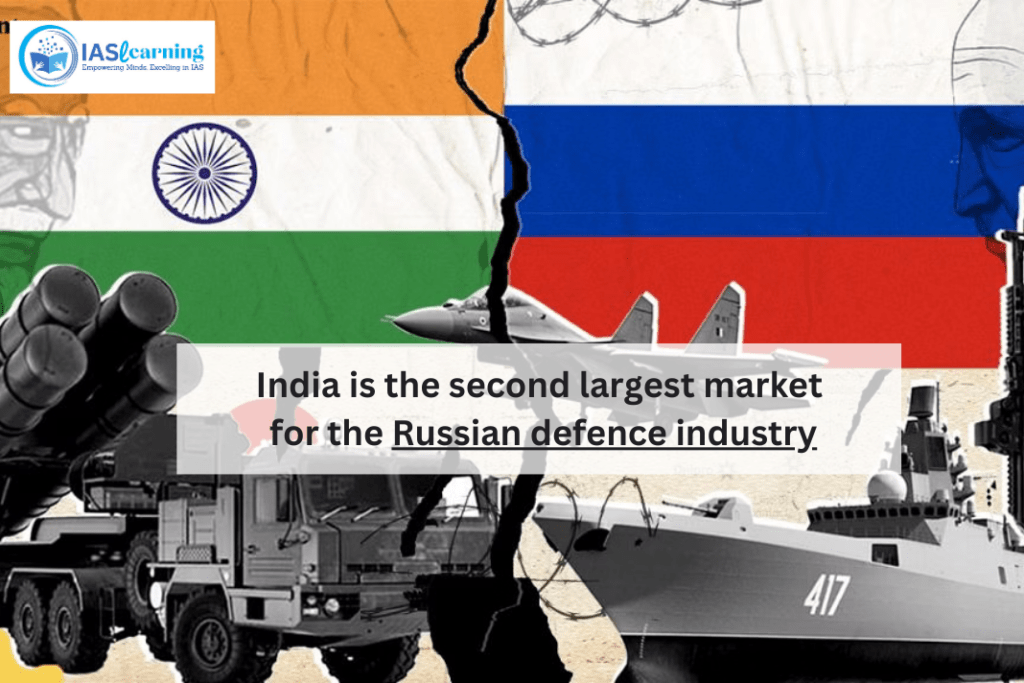
- CAATSA is a U.S. act aimed at countering aggression by Russia, Iran, and North Korea.
- India’s defense purchases from Russia, such as the S-400 system, faced potential sanctions under CAATSA.
Cultural Cooperation
- Indian studies have a long history in Russia, encompassing languages and cultural exchanges.
- Initiatives like “Namaste Russia” and festivals promote people-to-people contacts.
Russia-China-Pakistan Relations
- Russia’s deepening ties with Pakistan have raised concerns in India.
- Joint exercises and defense agreements between Russia and Pakistan signal closer cooperation.
- India faces the challenge of navigating these evolving dynamics while safeguarding its strategic interests.
Russia-India-China (RIC)
- RIC meetings underscore strategic, economic, and global cooperation.
- The trio’s collaboration can address shared concerns, such as peace in Afghanistan and volatile situations in West Asia.
- India should actively engage in RIC to shape global economic governance and energy security.
Treaty of Peace and Friendship (1971)
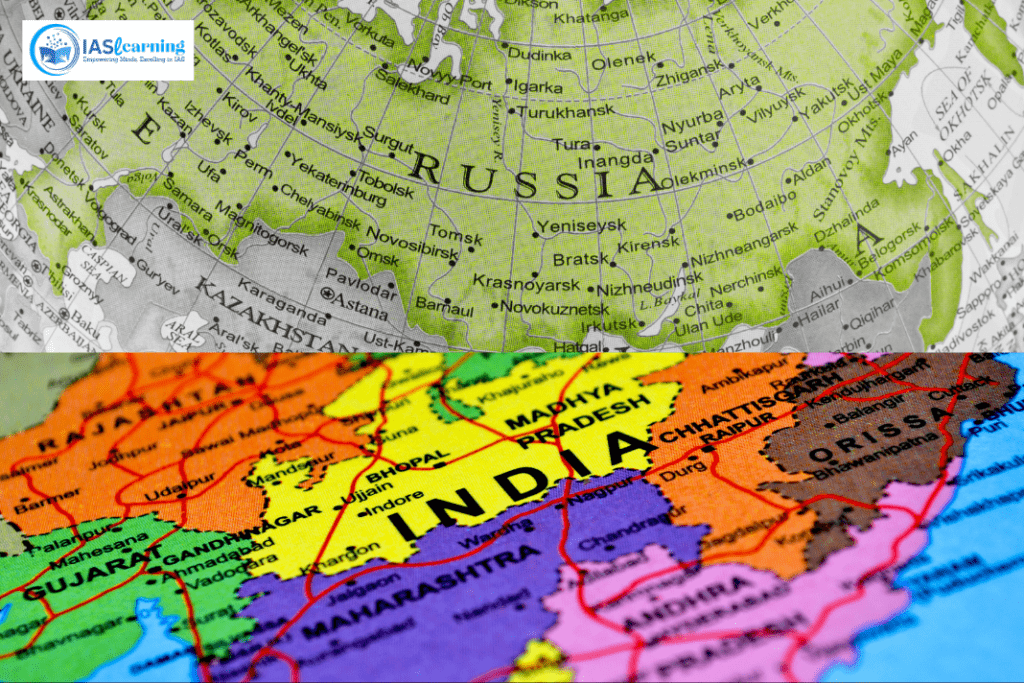
- In 1971, India and the Soviet Union signed the Treaty of Peace, Friendship, and Cooperation.
- This treaty was a milestone in their relations, emphasizing mutual trust and support.
Post-Cold War Era
- After the end of the Cold War and the dissolution of the Soviet Union, India and Russia adapted their relationship to changing global dynamics.
- They signed a new Treaty of Friendship and Cooperation in 1993, reaffirming their commitment to strategic partnership.
Strategic Partnership (2000)
- In 2000, during President Putin’s visit to India, the “Declaration on the India-Russia Strategic Partnership” was signed, elevating the relationship.
- This declaration expanded cooperation in areas like politics, security, defense, trade, technology, and culture.
Special and Privileged Strategic Partnership (2010)
- The partnership was further elevated to a “Special and Privileged Strategic Partnership” in 2010 during President Medvedev’s visit to India.
Key Aspects of India-Russia Foreign Relations
Defense and Military Cooperation
- One of the pillars of the relationship is defense cooperation. Russia has been a major supplier of defense equipment to India.
- Collaboration includes joint research, development, and production of advanced defense technology and systems.
- Recent defense agreements include the purchase of the S-400 missile defense system.
Political Cooperation
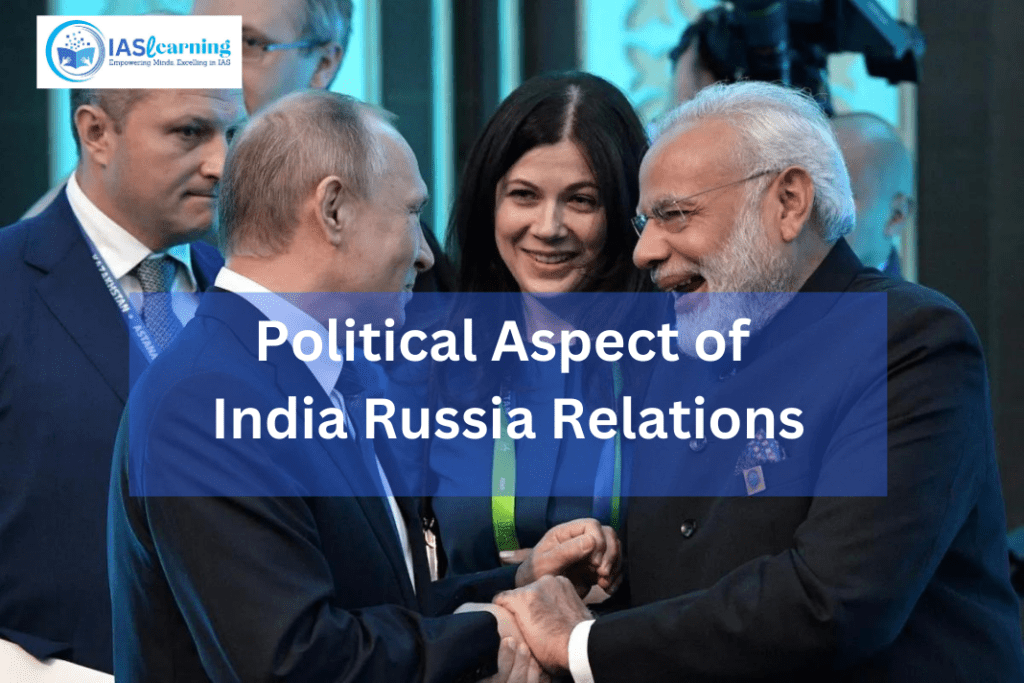
- Both countries cooperate on various political issues at the international level, such as United Nations reforms and support for each other’s candidature in international organizations.
Economic Ties
- Economic relations have gained prominence, with a focus on trade, investment, and energy partnerships.
- India’s “Make in India” initiative aligns with Russia’s interest in investing in Indian infrastructure projects and technology sharing.
Energy Cooperation
- Russia plays a crucial role in India’s energy security, with cooperation in the oil and gas sector.
- Notable projects include the Kudankulam Nuclear Power Plant and cooperation in nuclear energy.
Cultural and People-to-People Contacts
- Cultural exchanges promote mutual understanding, with Indian studies being taught in Russian institutions.
- Initiatives like “Namaste Russia” and festivals showcase Indian culture in Russia.
Multilateral Cooperation
- India and Russia collaborate in multilateral forums such as BRICS and the Shanghai Cooperation Organization (SCO).
- They work together on global issues like UN reforms and counter-terrorism efforts.
Challenges and Evolving Dynamics
- Russia’s growing ties with Pakistan and China have raised concerns in India.
- India must navigate these evolving dynamics while preserving its strategic interests and traditional ties with Russia.
- The changing global geopolitical landscape necessitates regular dialogue and adaptability in the India-Russia relationship.
Way Forward
- India and Russia should deepen cooperation on intelligence sharing to combat terrorism.
- Prioritize efforts to increase trade, investment, and energy partnerships.
- Pursue the proposed Free Trade Agreement (FTA) with the Eurasian Economic Union (EEU).
- To revitalize Indo-Russian relations, both countries should find substantive drivers for the relationship and address evolving geopolitical challenges.
Conclusion
As we look to the future, the India-Russia relationship continues to evolve. Both nations acknowledge the importance of adapting to contemporary global dynamics while preserving the historical camaraderie that binds them. Initiatives such as the annual India-Russia Summit underscore the commitment of their leaders to further strengthen this vital partnership.
India-Russia relationship is a remarkable example of how diplomacy and collaboration can transcend time and geographical boundaries. From its inception during the Cold War to its current status as a strategic partnership, this enduring bond continues to shape the destinies of two nations and leaves an indelible mark on the global stage. As the world watches, India and Russia are poised to script yet another chapter in their remarkable journey of friendship and cooperation.
Frequently Asked Questions (FAQ) about India-Russia Foreign Relations:
1. What is the history of India-Russia relations?
- India and Russia have enjoyed diplomatic relations since 1947. The partnership has deep historical roots and was further strengthened during the Cold War era. It has since evolved into a strategic and privileged partnership.
2. What are the key areas of cooperation between India and Russia?
- The key areas of cooperation include defense and military collaboration, political coordination, economic ties, energy cooperation, cultural exchanges, and participation in international organizations such as BRICS and the SCO.
3. What is the significance of defense ties between India and Russia?
- Defense ties are a cornerstone of the relationship. Russia has been a major supplier of defense equipment to India, and the two countries collaborate on joint research and development of advanced defense technology.
4. How do India and Russia cooperate in the economic domain?
- Both countries seek to enhance trade and investment. Russian companies are interested in participating in India’s “Make in India” initiative, and Indian businesses explore opportunities in Russia’s natural resources sector.
5. What are some notable energy projects between India and Russia?
- The Kudankulam Nuclear Power Plant (KKNPP) is a significant project with Russian assistance. The countries also collaborate on oil and gas projects, which are vital for India’s energy security.
6. How do cultural exchanges contribute to the relationship?
- Cultural exchanges foster mutual understanding. Indian studies are taught in Russian institutions, and initiatives like “Namaste Russia” promote Indian culture in Russia.
7. What challenges does the India-Russia relationship face today?
- Evolving dynamics, such as Russia’s growing ties with Pakistan and China, pose challenges for India. Navigating these dynamics while preserving strategic interests is a complex task.
8. How do India and Russia cooperate in multilateral forums?
- Both countries collaborate in various international organizations, including BRICS and the Shanghai Cooperation Organization (SCO). They work together on issues like UN reforms and counter-terrorism efforts.
9. What is the future outlook for India-Russia relations?
- The relationship continues to evolve in response to changing global geopolitics. Regular dialogue and adaptability are essential to maintain and strengthen the partnership in the evolving global context.
10. Why is India’s relationship with Russia significant in today’s world? – India’s relationship with Russia remains significant due to historical ties, defense cooperation, energy partnerships, and alignment on various global issues. It offers India strategic options in a complex international environment.

